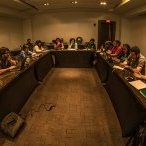English · Español

18 February 2016 | Videos | Agroecology | Resisting neoliberalism | Meeting of the Alliance for the Food Sovereignty | Food Sovereignty
Victorious decade
Gathering of the Alliance for Food Sovereignty in Latin America and the Caribbean in Panama city
Download: MP3 (2.7 Mb)
A member of the International Indian Treaty Council, the indigen Kuna Mani (Jorge Stanley) explains the meaning, challenges and achievements of the Alliance for Food Sovereignty meeting in Panama.
Unifying stances, actions and platforms between networks of organizations that develop action from Food Sovereignty and the Human Right to Food as a way to multiply the force of denunciation and advocacy is the reason for existence of the Alliance for Food Sovereignty in Latin America and the Caribbean, which these days is holding a representative meeting in Panama city.
This was summarized before the formal beginning of the consultation and meeting of the Alliance by the member of the International Indian Treaty Council (IITC), the indigen Kuna Mani (Jorge Stanley) in the video interview of Real World Radio.
About thirty networks of rural women, indigenous peoples, and environmental and agroecological movements are part of the Alliance today, that although articulated in March 2012 as such, it includes more than a decade of actions and convergences, Mani explains.
From February 19th to 21st this month, representatives of this organizations will be addressing issues such as Agroecology as a tool for food sovereignty, the role of the Food and Agriculture Organization of the United Nations (FAO), the compliance of Voluntary Guidelines on Access to Land, Rivers and Forests, and the counteroffensive towards agribusiness through the privatization of strategic resources such as seeds, fishery areas, and land suitable for agriculture.
Although organizations prepare here their comments prior to the 34th FAO’s Regional Assembly of Latin America and the Caribbean to be held in Mexico, they also seek to strengthen the political instrument of the Alliance, on the understanding that it is a joint experience that has managed to influence the politics of food and agriculture, having an impact both globally and on national and local policies.
“In Latin America, some states still resent the participation of social organizations in the development of public policies,” Mani regrets, but he recognizes that progress was made in the region, upon which transnational corporations maintain their pressure on governments.
Moreover, he also points out that some of the victories achieved by organizations of civil society through their participation at the FAO system require monitoring processes and accountability, such as the rights of access to land and territories.
He highlighted as well the counteroffensive towards biotechnology corporations, before some positive signals from the FAO and some states of visibility and promotion of agroecology and the principle of food sovereignty.
The Alliance for Food Sovereignty represents the political evolution of sectors and networks that were part of FAO’s International Planning Committee for Food Sovereignty in Latin America and the Caribbean.
As such, it is also involved in the Civil Society Mechanism (CSM) of the Committee on World Food Security, the only region so far participating in an articulated manner.







